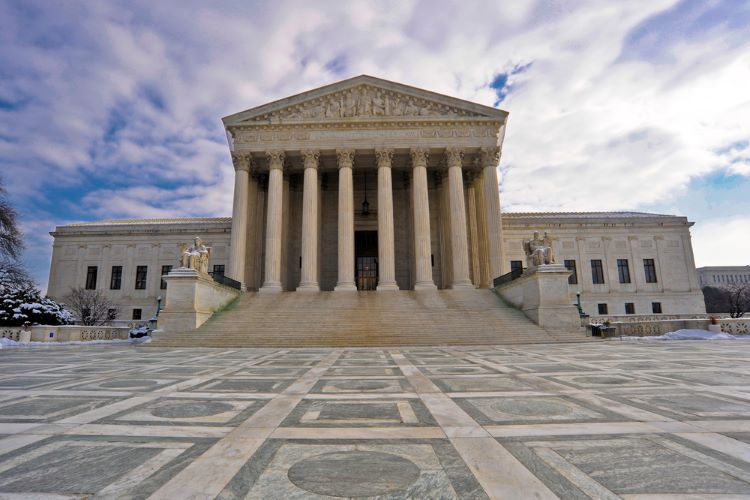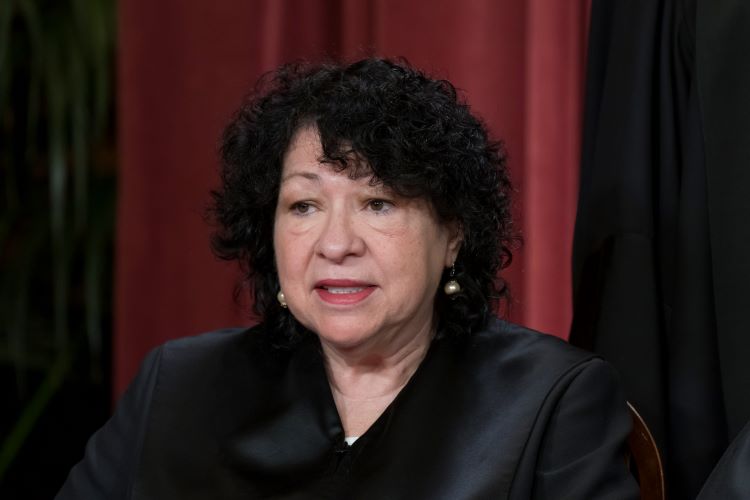[ad_1]
U.S. Supreme Court
How Supreme Court justices get free trips, push book sales and help school fundraising

Image from Shutterstock.
Supreme Court justices are reaping the benefits of their teaching gigs and public appearances, according to a series of investigative stories by the Associated Press.
The AP investigation relied on documents acquired through more than 100 public records requests, according to a summary of how the reporting was done. Key findings are here.
The stories report:
• Some teaching gigs in locations across the globe “are light on classroom instruction, with ample time carved out for the justices’ leisure,” according to this AP story. Documents show schools have paid justices’ airfare to and from the teaching location, their living expenses while there and even the cost of side trips.
Some of the teaching jobs have been in Italy, Iceland, England and Hawaii.
Sometimes the cost of travel is paid by anonymous donors to the schools. And sometimes justices mingle with prominent law school donors during the trips (although Justice Sonia Sotomayor’s staff made clear she should not meet with donors in emails to one school, the University of Hawaii.)
Little is known about the teaching engagements because the justices “are only required to offer a spare accounting on their annual financial disclosure forms,” the AP story says. Justices can’t earn more than $30,000, the cap on outside income.
 Justice Sonia Sotomayor received scrutiny in the AP series for her book sales and college trips. (Photo by J. Scott Applewhite/The Associated Press)
Justice Sonia Sotomayor received scrutiny in the AP series for her book sales and college trips. (Photo by J. Scott Applewhite/The Associated Press)• Staff members for Justice Sonia Sotomayor have pushed institutions hosting her appearances to buy the justice’s memoir or her children’s books. Several justices have written books, but none “has as forcefully leveraged publicly sponsored travel to boost book sales as has Sotomayor,” the AP reports.
Penguin Random House, the publisher of Sotomayor’s books, has also pushed for book purchases at the justice’s events.
Book income is not subject to the $30,000 cap on outside income for the justices. According to a Supreme Court statement, staff members recommend a number of books be available based on audience size “so as not to disappoint attendees.”
Staff members in other branches of government would not be allowed to push book sales for members of Congress or the executive branch.
An unnamed source told AP that Sotomayor has already received a $3.1 million advance for her memoir, My Beloved World. She won’t receive any more money unless hundreds of thousands of additional books are sold, which is more than double the purchases to date. But Sotomayor does continue to earn royalties on her children’s books.
Sotomayor didn’t recuse herself in several matters involving Penguin Random House that came before the Supreme Court. According to a Supreme Court statement, Sotomayor would have recused herself in cases in which the publisher was a party. But “an inadvertent omission failed to bring Penguin’s participation in several cases to her attention.” Cert was denied in those cases, however. “Chambers’ conflict check procedures have since been changed,” the statement said.
• Schools hosting appearances by Supreme Court justices have used the occasion to invite donors and possible donors to dinners and luncheons with the justices, the Associated Press reports. Some of the donors are from industries that have had interests before the court.
In addition, some justices have participated in speaking events with prominent politicians, lending “the prestige of their positions to partisan activity,” the AP says.
The Supreme Court says it routinely asks event organizers to confirm that an event featuring a justice is not a fundraiser. But the Supreme Court’s definition of a fundraising “does not account for soliciting contributors later while reminding them of the special access they were afforded,” according to the article.
The Supreme Court also told the AP that the presence of an elected official during a justice’s appearance “does not necessarily render the event impermissibly political in nature.”
The Supreme Court’s full statement to the Associated Press is here.
Supreme Court justices are not bound by the ethics code that applies to other federal judges. But Chief Justice Roberts said in April that the justices have agreed to follow guidelines in a Statement on Ethics Principles and Practices.
The ABA House of Delegates passed a resolution in February calling on the Supreme Court to adopt a binding code of ethics for justices.
The AP report implicates “nearly every sitting justice and several recently retired or departed justices, Republican and Democratic appointees alike,” according to a press release by court transparency group Fix the Court.
“The justices need a wholesale reimagination of—and rededication to—their ethical responsibilities,” Fix the Court executive director Gabe Roth said in a statement from the press release. They “can start by avoiding fundraisers, agreeing not to use their staffs in service of their own enrichment and filing the same pre- and post-travel reports that lawmakers submit, detailing the costs of transportation, lodging, food and entertainment.”
[ad_2]




